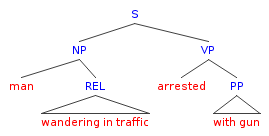Annals of with
Language Log 2013-03-21
In the comments section of the London (Ontario) Free Press, there was a frank exchange of views on the grammaticality of the headline "Man wandering in traffic arrested with gun" (3/20/2013). A small sample follows.
Susan Franks complained:
Please, as journalists try to write headlines that make sense.
Try "Man With Gun Wandering in Traffic Arrested"
I am not putting you down, I just would like to see and hear a little better grammar from professionals.
Evan Harper responded:
Speaking as a practical full-time unpaid Free Press copyediting complainer, I'm at a loss to understand what you think is ungrammatical about the headline.
louderthebetter supported Ms. Franks:
The headline is grammatically incorrect because it implies that the perp was arrested for wandering in traffic and that the gun was a tool used in the arrest […]
Evan Harper came back:
Try searching Google for "arrested-with-*" and tell me with a straight face that all of those headlines are implying that "stolen gun in downtown Seattle," "more than 8 pounds of pot," "credit card of shooting victim", etc are tools of arrest. It may shock you to learn this but natural language depends on cultural and contextual knowledge shared between communicants, not tortured attempts at "logical" syntax, to resolve ambiguities.
There are at least two issues here, it seems to me. One involves the syntax and semantics of the prepositional phrase "with gun"; and the other is the idea that bad writing must be bad grammar.
Susan Franks, louderthebetter, and those who take their side apparently think that "with gun" is meant to be an extraposed modifier of "man wandering in traffic", as the sentence-final prepositional phrases are in e.g.
Information is available about that topic. A rumor is circulating of unexpectedly missing funds.
This construction (where a clause-final PP is syntactically and semantically linked with the subject) is relatively rare, probably because the PP is so easily misinterpreted as linked with the verb or with another post-verbal element. Thus
A woman with an umbrella opened the door
is not felicitously reworded as
A woman opened the door with an umbrella.
But this would be unwise, or perhaps we should say inconsiderate, not ungrammatical.
And in any event, as Evan explained, that's not what's happening in this case. Not all verb-associated with-phrases are instrumental — there are plenty of other available meanings. The Merriam-Webster online entry for with gives 28 senses, only one of which is the instrumental
6 a —used as a function word to indicate the means, cause, agent, or instrumentality <hit him with a rock> <pale with anger> <threatened with tuberculosis> <he amused the crowd with his antics>
8 a (1) : in possession of : having <came with good news> (2) : in the possession or care of <left the money with her mother>
Man arrested with suspected stolen credit cards Man arrested with multiple bags of marijuana in his car Man arrested with explosives Woman arrested with BAC more than 3 times the legal limit Piscataway man arrested with gun, hollow-point bullets Mesa man arrested with war paint, multiple weapons Man arrested with fake CIA badge Two Midland Men Arrested With Drugs Brandon man arrested with $10K cash, bayonet 2 separate travelers arrested with loaded guns in carry-ons Orlando Middle Schooler arrested with two guns Man with DUI warrant arrested with drugs Felon arrested with gun in downtown Seattle Juvenile Arrested with Marijuana at High School
Using "arrested with" to mean "arrested while in possession of" seems to be so much the norm, in fact, that it would be bad practice to write a headline of the form "X arrested with gun" to mean that X was arrested at gunpoint.
Now, I don't think there's any Zombie Rule lurking in the shrubbery about "clause-final with-phrases". And if the reaction to this headline were a consequence of a general objection to potential ambiguity, no written or spoken sentence would be safe. So it seems likely that something about the specific headline "Man wandering in traffic arrested with gun" was problematic for Susan Franks and some others. Perhaps "wandering in traffic" offers a reason for the arrest, and so readers look for some other role to assign to "with gun"?
But the syntax of this headline is simple and absolutely standard:

And the "arrested with gun" part is not only syntactically normal, it's semantically and pragmatically common to the point of being a cliche.
So the immediate leap from "something about this bothers or confuses me" to "it's ungrammatical" was unusually inappropriate in this case.